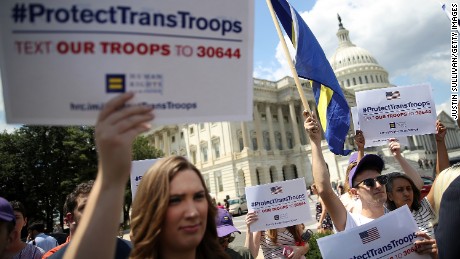During the Obama administration, Congress and federal agencies came down on the side of civil rights for transgender and gender-nonconforming people, building on years of court decisions. This proposal seeks to undermine those protections.Here's how it came about and what it could mean for transgender people.
What does the Trump administration want to change, according to the report?
The American medical community currently recognizes a distinction between sex — a classification based on bodily characteristics, internal and external — and gender, the socially constructed roles and behaviors typically ascribed to men and women. It also recognizes that no single aspect of sex or gender defines a person's gender identity — their internal sense of gender, which may not match the sex assigned to them at birth. As such, the American medical community has called for legal protections for those whose gender identity does not fit squarely into the categories of man or woman, such as transgender and gender-nonconforming people. And several courts have granted them those protections through prohibitions against sex stereotyping. The argument goes that to deny someone a job because they're not masculine or feminine enough constitutes sex-based discrimination. Now, according to The Times' report, the Trump administration appears to be drafting federal guidance that rejects that interpretation. A memo obtained by the newspaper defines sex as "a person's status as male or female based on immutable biological traits identifiable by or before birth." If adopted, such a definition could exclude transgender people from existing federal civil rights protections in education, employment and access to health care.
What do you mean by federal guidance?
The memo obtained by the Times specifically articulates a proposal to create a definition for "sex" under Title IX, the federal civil rights law that forbids discrimination in schools receiving government funds. Right now, Title IX says that no person shall be subjected to discrimination in any educational program or activity based on sex — but it doesn't define "sex" or "discrimination."As part of its mandate, the Department of Education has issued guidance over the years fleshing out those definitions, based on what it believes Congress intended to achieve — or guard against — with Title IX. Such guidance included interpretations of the statute's sex-based provisions to cover gender identity.Federal courts have relied on those interpretations over the years to conclude that transgender people are protected from discrimination in education — and many other contexts.The memo obtained by The Times says that "the sex listed on a person's birth certificate, as originally issued, shall constitute definitive proof of a person's sex unless rebutted by reliable genetic evidence." Some states and the federal government currently allow people to change their sex or gender markers on forms of identification — and it's unclear what would happen to scores of people who have already legally changed their IDs.It's also not clear how such a definition would apply to people born with intersex traits, or sex characteristics such as genitals or chromosomes that are not clearly male or female.Civil rights groups say the proposal is a continuation of the administration's efforts to deny the existence of transgender people. Just one month into Trump's presidency, the administration rescinded Obama-era Education Department guidance recommending that schools let students use facilities and pronouns consistent with their gender identity. In October 2017, Attorney General Jeff Sessions reversed guidance that protected transgender workers from employment discrimination. And Trump has signed a directive banning transgender military recruits, though the ban has been blocked by a federal court.Such moves signaled the administration's disregard for the transgender community, said Omar Gonzalez-Pagan, senior attorney and health care strategist for Lambda Legal."We knew that a rule was coming," he said, "we just didn't know it would be as outrageous or bad as this memo purports it to be."
Just one month into Trump's presidency, the administration rescinded Obama-era Education Department guidance recommending that schools let students use facilities and pronouns consistent with their gender identity. In October 2017, Attorney General Jeff Sessions reversed guidance that protected transgender workers from employment discrimination. And Trump has signed a directive banning transgender military recruits, though the ban has been blocked by a federal court.Such moves signaled the administration's disregard for the transgender community, said Omar Gonzalez-Pagan, senior attorney and health care strategist for Lambda Legal."We knew that a rule was coming," he said, "we just didn't know it would be as outrageous or bad as this memo purports it to be."
What will transgender people lose if the proposal succeeds?
Several federal agencies under the Obama administration interpreted their anti-discrimination statutes to cover gender identity. The shift reflected the medical community's recognition that being transgender is not a mental illness or a choice but rather a status deserving of legal protections. Recognizing that those who don't conform to gender stereotypes are especially vulnerable to harassment and discrimination in schools, President Barack Obama's education department expanded Title IX's sex-based protections to include gender identity. The Department of Labor, the Equal Employment Opportunity Commission and the Department of Health and Human Services under Obama issued similar interpretations of anti-discrimination statutes.Defining sex in a way that denies the existence of transgender people could roll back federal protections. But civil rights groups say it won't change state and local laws forbidding discrimination against transgender people.
Will the change have broader ripple effects beyond schools?
If adopted, civil rights groups say the new definition of sex would codify the administration's position that the transgender community is not deserving of civil rights protections in other areas of public life, as well.The Times reported that HHS is leading the effort to define sex under Title IX, arguing in the memo that key federal agencies need to adopt a definition "on a biological basis that is clear, grounded in science, objective and administrable."  If the Department of Education adopts the definition, it would follow that other agencies will adopt it, said Jocelyn Samuels, executive director of UCLA Law's Williams Institute, a think tank dedicated to sexual orientation, gender identity law and public policy."I think that their goal is to have it apply across the board to all sex discrimination prohibitions under federal law," she said.It would also send a signal to the wider world that the Trump administration does not recognize transgender people as a minority group that should be defended from discrimination. That signal might influence the decisions, for example, of health insurers that now cover procedures involved in gender-affirming care — sometimes called "transitioning," or changing a person's physical characteristics to align with their gender identity. But even with current protections, some policies offered on the Affordable Care Act marketplace in 2018 refused to cover gender-affirming treatment, a CNN investigation found.
If the Department of Education adopts the definition, it would follow that other agencies will adopt it, said Jocelyn Samuels, executive director of UCLA Law's Williams Institute, a think tank dedicated to sexual orientation, gender identity law and public policy."I think that their goal is to have it apply across the board to all sex discrimination prohibitions under federal law," she said.It would also send a signal to the wider world that the Trump administration does not recognize transgender people as a minority group that should be defended from discrimination. That signal might influence the decisions, for example, of health insurers that now cover procedures involved in gender-affirming care — sometimes called "transitioning," or changing a person's physical characteristics to align with their gender identity. But even with current protections, some policies offered on the Affordable Care Act marketplace in 2018 refused to cover gender-affirming treatment, a CNN investigation found.
Are there things this measure can't change?
Experts say the administration cannot undo decades of case law protecting transgender people through bans on sex discrimination and sex stereotyping. One of those cases was decided by the Supreme Court in 1989. Price Waterhouse v. Hopkins involved a female employee who sued after she was passed over for a promotion for being too "macho."  The court held that discriminating against someone for not conforming to gender stereotypes is sex-based discrimination. Several courts have relied on the Price Waterhouse ruling in job discrimination cases, including a recent 6th Circuit Court of Appeals decision in favor of a transgender woman who lost her job at a funeral home after coming out.And many states have already passed their own laws protecting the transgender community. While it's doubtful they'd walk them back, the proposed definition could inspire challenges to those laws, such as one that will be on the midterm ballot in Massachusetts. Question 3 asks voters if they want to keep a law that prohibits discrimination on the basis of gender identity in public accommodations.
The court held that discriminating against someone for not conforming to gender stereotypes is sex-based discrimination. Several courts have relied on the Price Waterhouse ruling in job discrimination cases, including a recent 6th Circuit Court of Appeals decision in favor of a transgender woman who lost her job at a funeral home after coming out.And many states have already passed their own laws protecting the transgender community. While it's doubtful they'd walk them back, the proposed definition could inspire challenges to those laws, such as one that will be on the midterm ballot in Massachusetts. Question 3 asks voters if they want to keep a law that prohibits discrimination on the basis of gender identity in public accommodations.
What happens next?
If adopted, the proposal described by The Times would be published in the Federal Register, where the public would have the chance to submit comments for the administration to consider before issuing a final rule.If it becomes policy, court battles will likely ensue that could bring the issue to the Supreme Court, Samuels and Gonzalez-Pagan said.
What does this suggest about the administration's future plans, beyond changing Title IX?
The Trump administration has shown interest in changing the Affordable Care Act's anti-discrimination rule, which specifically covers gender identity. The rule, known as Section 1557, forbids discrimination in health care programs and activities that receive federal funds. It prevents insurance companies from selling policies that completely exclude gender-affirming treatment from coverage.Lawyers and experts who spoke to CNN said that HHS' involvement suggests the move is linked to the effort to rewrite 1557. To change it, experts say the administration must change the underlying statutes upon which it is based. One of them is Title IX.It remains to be seen what a new version of Section 1557 would look like. But if it follows the definition of sex outlined in the memo obtained by The Times, it may strip existing gender identity protections and invalidate the ban on policy exclusions for gender-affirming treatment.
Original Article
[contf] [contfnew] 
CNN
[contfnewc] [contfnewc]






